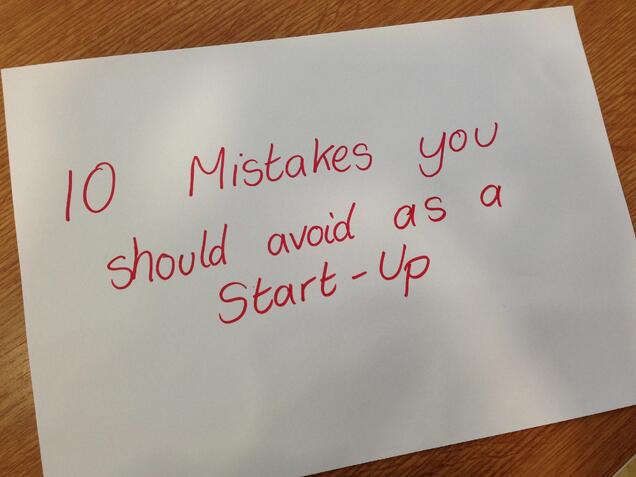
Launch day is drawing unnervingly closer.
Will your product be a success? Or will it, like three out of four start-ups, be discarded onto the failure heap before it’s even got going?
The trick is not to put yourself in this position in the first place. The gold rule of any business venture is to have a pretty solid understanding that your product or services are going to be successful. In order to have such an understanding you will need to carry out extensive market research prior to the launch date.
Of course, in reality, knowing your start-up is going to be a success is easier said than done. If this was the case, then why do the majority of entrepreneurs fail to meet their goal of becoming a millionaire by the time they are 30?
That said, there are certain fairly common mistakes start-ups make that can and should be avoided. And the best way to avoid going down dead-end avenues that are likely to prove detrimental to your business, is to avoid them.
With this is mind, take the time to look at the following 10 start-up mistakes you should avoid.
1- 1 Failing to carry out adequate research
It has been said that 9 out of 10 start-ups fail because their original concept isn’t viable. They are so desperate to be in business that they fail to do enough homework prior to the launch of their product. Thus, the business is doomed from the offset.
2- 2 Spend too much money
It is quite easy to get carried away in pumping 20 years’ of savings into your business venture – after all you have to ‘speculate to accumulate’. As cash flow is the bloodline of every business, it is important to protect the capital you have as you never know when you’ll need it.
As Andy Karuza of Brandbuddee advises:
“Anything unexpected can come up after you launch. You might not realise your product needs more work before people will buy it. Don’t spend all your money up front; you need enough to last through the first year or until you gain traction.”
3- 3 Forget to have a Plan B in place
It is not uncommon for young businesses to be so full of optimism that their venture is going to succeed that when things do go wrong there is no backup plan in place. For example, if your manufactured product is failing to sell as well as you had hoped, do you close operations, spend more money improving the product or resort to a different plan? Without that plan in place, the future looks depressingly bleak.
4- 4 Proceeding without emergency funds
If you don’t have a backup plan in place, the chances are you don’t have any emergency funds available either. The two go hand in hand really as a plan B typically requires the money to fund it. Without the funds available your start-up could sink before it’s out of the starting blocks.
5- 5 Believe that your job is done
A director and business owner’s job is never completely done and it would be a mistake to think that the hard work was over when the product has gone ‘live’. In reality, the game has only just begun. As John Meyer of Lemonly says:
“After all your work designing, developing and testing, there’s a celebration when you click launch because you think you’ve made it. But that isn’t the finish line – it’s the starting line. Shift your mindset to know the hard work happens after the launch.”
6- 6 Miscalculate market size
It is very easy to get excited about your own product, so much so that you inflate financial projections to investors. In reality, most products sell to a lot less than 1 percent so believing that your product is going to sell to millions before having any ‘proof’ can set you up for disappointment.
7- 7 Embarking on a PR campaign before the product is ready
Adequate PR is essential for every start-up but it is important you get the timing right. It might be tempting to launch a comprehensive social media campaign, attend every networking event in your field from London to Leeds to shout about your business venture, but if your start-up isn’t ready to be opened to the public, your efforts will be wasted.
8- 8 Spending a lot of money on offices, staff and facilities
Companies that fail typically comprise of, as Entrepreneur writes, “lower sales, higher costs and too much overhead.”
Refrain from signing a 12-month contract with a state-of-the-art office block on Canary Wharf and handing out employment contracts offering fantastic salaries before you have a proven turnover to justify such expenditures.
9- 9 Failing to outsource certain business aspects
While it is tempting for over-optimistic start-ups to be lavish in their pre-product launch spending, it can be equally as tempting to take on everything themselves and not have the time to dedicate to elemeys of their business which will help it grow – like driving sales.
You don’t need to spend the earth and blow your budget outsourcing certain elements of your business to people who are professionals in that field. For example, having a chartered accountant take care of your tax issues will free up some of your valuable time without costing a fortune.
Take a look at our earlier blog on ‘40 things you should outsource’ in order to free up time to areas of the business that will nurture growth instead of festering for failure.
10- 10 Lacking simplicity
It is fairly common for start-ups and entrepreneurs to have their ‘fingers in too many pies.’ Whilst it might be sensible not to put ‘too many eggs in one basket’, being involved in too many projects can result in neglecting your main venture, which can ultimately lead to failure.
Are you a start-up who has succeeded? Or perhaps your business venture failed for a specific reason? We’d love to hear your experiences and tips of how to be a successful start-up.

